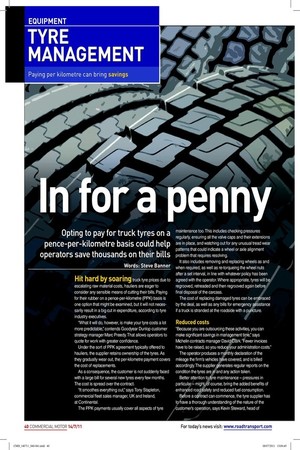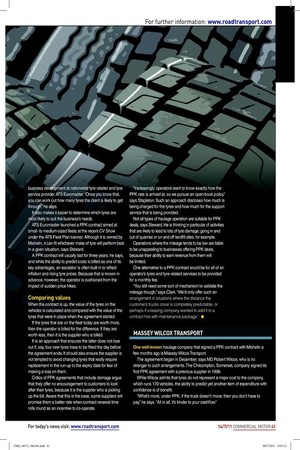In for a penny
Page 34

Page 35

If you've noticed an error in this article please click here to report it so we can fix it.
Opting to pay for truck tyres on a pence-per-kilometre basis could help operators save thousands on their bills
Words: Steve Banner Hit hard by soaring truck tyre prices due to escalating raw material costs, hauliers are eager to consider any sensible means of cutting their bills. Paying for their rubber on a pence-per-kilometre (PPK) basis is one option that might be examined, but it will not necessarily result in a big cut in expenditure, according to tyre industry executives.
“What it will do, however, is make your tyre costs a lot more predictable,' contends Goodyear Dunlop customer strategy manager Marc Preedy. That allows operators to quote for work with greater confidence.
Under the sort of PPK agreement typically offered to hauliers, the supplier retains ownership of the tyres. As they gradually wear out, the per-kilometre payment covers the cost of replacements.
As a consequence, the customer is not suddenly faced with a large bill for several new tyres every few months. The cost is spread over the contract.
“It smoothes everything out,' says Tony Stapleton, commercial fleet sales manager, UK and Ireland, at Continental.
The PPK payments usually cover all aspects of tyre maintenance too. This includes checking pressures regularly, ensuring all the valve caps and their extensions are in place, and watching out for any unusual tread wear patterns that could indicate a wheel or axle alignment problem that requires resolving.
It also includes removing and replacing wheels as and when required, as well as re-torqueing the wheel nuts after a set interval, in line with whatever policy has been agreed with the operator. Where appropriate, tyres will be regrooved, retreaded and then regrooved again before final disposal of the carcass.
The cost of replacing damaged tyres can be embraced by the deal, as well as any bills for emergency assistance if a truck is stranded at the roadside with a puncture.
Reduced costs
“Because you are outsourcing these activities, you can make significant savings in management time,' says Michelin contracts manager David Clark. “Fewer invoices have to be raised, so you reduce your administration costs.'
The operator produces a monthly declaration of the mileage the firm’s vehicles have covered, and is billed accordingly. The supplier generates regular reports on the condition the tyres are in and any action taken.
Better attention to tyre maintenance – pressures in particular – might, of course, bring the added benefits of enhanced road safety and reduced fuel consumption.
Before a contract can commence, the tyre supplier has to have a thorough understanding of the nature of the customer’s operation, says Kevin Steward, head of business development at nationwide tyre retailer and tyre service provider ATS Euromaster. “Once you know that, you can work out how many tyres the client is likely to get through,” he says.
It also makes it easier to determine which tyres are most likely to suit the business’s needs.
ATS Euromaster launched a PPK contract aimed at smallto medium-sized fleets at the recent CV Show under the ATS Fleet Plan banner. Although it is owned by Michelin, it can fit whichever make of tyre will perform best in a given situation, says Steward.
A PPK contract will usually last for three years, he says, and while the ability to predict costs is billed as one of its key advantages, an escalator is often built in to reflect inflation and rising tyre prices. Because that is known in advance, however, the operator is cushioned from the impact of sudden price hikes.
Comparing values
When the contract is up, the value of the tyres on the vehicles is calculated and compared with the value of the tyres that were in place when the agreement started.
If the tyres that are on the fleet today are worth more, then the operator is billed for the difference. If they are worth less, then it is the supplier who is billed.
It is an approach that ensures the latter does not lose out if, say, four new tyres have to be fitted the day before the agreement ends. It should also ensure the supplier is not tempted to avoid changing tyres that really require replacement in the run-up to the expiry date for fear of making a loss on them.
Critics of PPK agreements that include damage argue that they offer no encouragement to customers to look after their tyres, because it is the supplier who is picking up the bill. Aware that this is the case, some suppliers will promise them a better rate when contract renewal time rolls round as an incentive to co-operate. “Increasingly, operators want to know exactly how the PPK rate is arrived at, so we pursue an open-book policy,” says Stapleton. Such an approach discloses how much is being charged for the tyres and how much for the support service that is being provided.
Not all types of haulage operation are suitable for PPK deals, says Steward. He is thinking in particular of activities that are likely to lead to lots of tyre damage; going in and out of quarries or on and off landfill sites, for example.
Operations where the mileage tends to be low are liable to be unappealing to businesses offering PPK deals, because their ability to earn revenue from them will be limited.
One alternative to a PPK contract would be for all of an operator’s tyres and tyre-related services to be provided for a monthly fee.
“You still need some sort of mechanism to validate the mileage though,” says Clark. “We’d only offer such an arrangement in situations where the distance the customer’s trucks cover is completely predictable, or perhaps if a leasing company wanted to add it to a contract hire with maintenance package.” ■













































